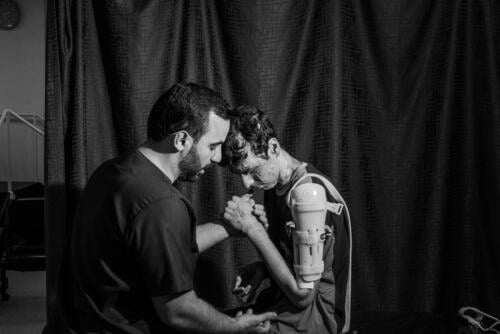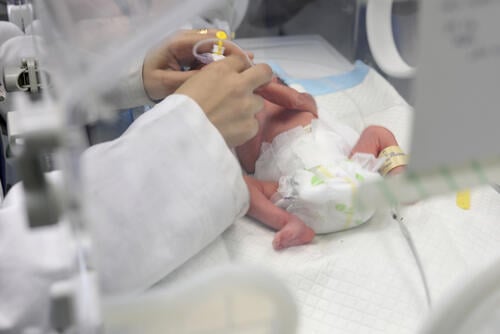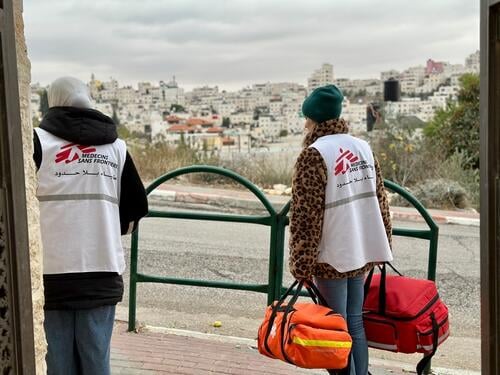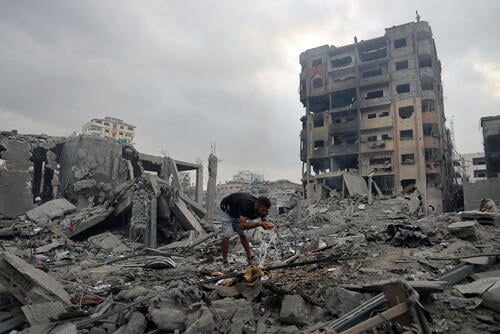As the sun streaks through the small window of the sterile hospital room, warm orange lines fall on to the side of 17-year-old Karam’s face, highlighting ridges of white scars across his left cheek. As he gets up slowly into sitting position at the hospital run by Médecins Sans Frontières (MSF) in Amman, Jordan, he uses his right hand to strap a long piece of skin-coloured plastic onto his upper left arm.
“I had heard that, when you die, you can still hear people’s voices as they bury you, that you can hear their prayers and their footsteps as they walk away from your final resting place,” says Karam.
“In the ambulance, I could feel the speed bumps but I couldn’t open my eyes. I could still hear voices, so I was afraid, afraid that maybe I was already dead.”
On 14 February 2024, an Israeli airstrike obliterated Karam’s home in Gaza, Palestine, killing everyone in his family except for his seven-year-old sister, Ghina, and his father, Ziad. Karam was badly injured, with burns across his whole face and body.
That day, Al-Aqsa hospital was overwhelmed with casualties after the bombing of Nuseirat camp in central Gaza by Israeli forces. When Karam arrived at the hospital, the emergency room team tried to resuscitate him, but without success.
One hour later, Karam’s uncle, who worked as a nurse at Al-Aqsa hospital, entered the emergency room and realised that his nephew was still breathing. He rushed Karam to the operating theatre, where MSF staff performed CPR and emergency surgery, saving his life.
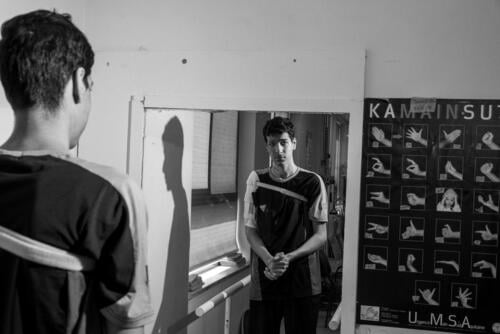
His father, Ziad, a psychologist for UNRWA, was working at a refuge centre when his family home in Nuseirat was hit.
“When I found out about the strike, I rushed to Al-Aqsa, as my neighbour told me that Ghina and Karam had been taken there,” says Ziad. “I got to the emergency room and there were bodies everywhere, all over the floor. I found my daughter, Ghina; she had first-degree burns on her face, shoulders and back.”
The impact of the bomb dropped on Ziad’s home was so profound that the remnants of the house were suctioned into the ground. The bomb killed 13 members of Ziad’s family, including his wife, his youngest son Mohammed and his eldest son Tareq, who had become stuck in Gaza due to the war while visiting from Russia, where he was studying dentistry.
“When Karam was brought into the emergency room, I didn’t notice it was my son,” says Ziad. “He had no human features on him. There were no clothes left on him. His body was completely black. His eyes were closed.”
After stabilising Karam, MSF and Ministry of Health staff at Al-Aqsa hospital performed six rounds of plastic surgery on Karam’s severely burned body. For seven days he was in a coma.
When Karam was brought into the emergency room, I didn’t notice it was my son. He had no human features on him. His body was completely black.Ziad, Karam's father
Karam was later evacuated to the Emirati floating hospital in Al-Arish, Egypt, before being flown to MSF's reconstructive surgery hospital in Amman, where he is currently receiving comprehensive rehabilitation, along with his sister and other patients who have been medically evacuated from Gaza.
Thousands in need of specialised medical care trapped in Gaza
The small number of patients from Gaza receiving vital rehabilitation at MSF’s hospital in Amman are barely a ripple on the surface of the deep ocean of needs across the Gaza Strip.
“We know from our experience at the reconstructive surgery hospital in Amman, where we have treated people with war wounds from the region for nearly 20 years, that typically up to four per cent of people who suffer war injuries will need reconstructive surgery,” says Moeen Mahmood Shaief, MSF head of mission in Jordan.
“In the case of Gaza, we are talking about nearly 100,000 people who have been injured since 7 October, therefore we are looking at up to 4,000 people in Gaza who need reconstructive surgery and comprehensive rehabilitation,” he says.
According to the World Health Organization, 41,000 people have been killed in Gaza in the almost 12 months since the war started on 7 October 2023, and 95,000 people have been injured. At least 12,000 people in Gaza are still in need of medical evacuation.
However, the process that allows a wounded patient to be referred abroad for care is long and complicated. The Israeli authorities’ criteria for approving requests are unclear and patients often have to wait months for a response. Almost 60 per cent of requests for medical evacuations from Gaza are turned down, according to the World Health Organization. This includes requests to evacuate wounded children and their caretakers, according to MSF.
“Of the eight cases for which we applied for medical evacuation in August, only three were approved with their caretakers by the Israeli authorities,” says Dr Hani Isleem, MSF project coordinator for Gaza medical evacuations.
“We will apply again for the next batch, but it is 100 per cent clear that they will not approve all the patients. Perhaps they are suspicious of allowing adults to leave the Gaza Strip, but even that suspicion cannot explain the refusal to evacuate children.”
MSF calls on the Israeli authorities to ensure medical evacuations for Palestinians in need of specialised medical care, including their caregivers, and for other states to receive and facilitate treatment outside of Gaza, while ensuring that all patients and their caregivers are guaranteed safe, voluntary and dignified return to Gaza.
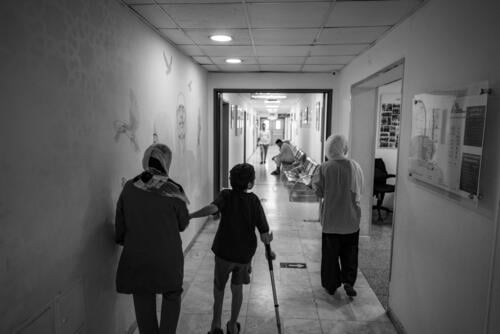
Deema and Hazem
Deema, 11, and her family, were sheltering at their home in Gaza City when their neighbour’s house was hit by an airstrike on 10 October 2023. Deema was on the fourth floor, holding her baby nephew in her arms, when the building collapsed around them. Deema fell four storeys to the ground floor.
“It was pitch black under the rubble,” says Deema. “I couldn’t open my eyes and could barely breathe. I couldn’t hear anyone and I couldn’t speak, there was dust and stones covering my face. I was convinced that I was going to die.”
“I managed to move my hand under the rubble and used a cable to signal to people that I was there. I remember hearing voices, and I felt air on my leg, and soon people were pulling me out and rushing me to the ambulance. Till this day, they haven’t found my baby nephew.”
Seventy-five people were killed in the strike, including Deema’s 14-year-old brother, Hamza. Her younger brother, Hazem, had been playing football outside and was also severely injured when the building collapsed. After the dust settled and rescue teams arrived at the scene, Deema and Hazem were rushed to Al-Shifa hospital, where they received emergency medical care.
Due to the incessant bombardments of Gaza City, Deema, Hazem and their mother, Eman, stayed at Al-Shifa hospital for six months, eating, sleeping and receiving care there, along with thousands of other Palestinians who were taking shelter inside the hospital.
On 18 March 2024, Israeli forces surrounded the hospital, forcing the thousands of people inside to flee. In the chaos of the evacuation, Deema became separated from her mother and Hazem, who were forced to move to the south. Meanwhile, Deema managed to reunite with her father, and took shelter with him in Asma’a School in Gaza City, where they remained for 45 days.
“We stayed in a classroom with around 50 families,” says Deema. “We had almost no food or water, and there was no electricity or gas, so we had to light fires. My shoulder was broken, and I couldn’t move it at all and I was barely able to walk at that time.”
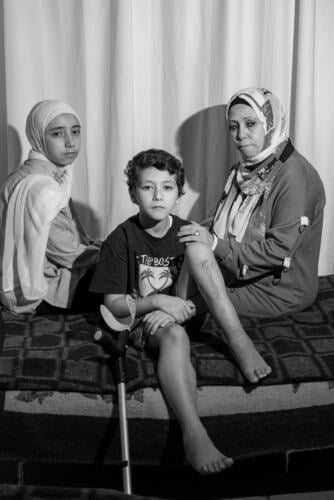
In early May, Deema was at last able to travel to the south of Gaza, where she was reunited with her mother and Hazem in Rafah. One week later they were medically evacuated, first to Egypt and then to MSF’s hospital in Amman, where Deema and Hazem continue to receive reconstructive surgery, physiotherapy and mental health support.
Deema suffered fractures to her right femur and shoulder, as well as an open wound to her forehead, as a result of the attack on her home. In Amman, she is working daily with the MSF physiotherapy team to encourage her fractured bones to heal before the external fixator in her leg can be removed. With time, she hopes to be able to regain full function of her limbs.
“I wasn’t able to move my ankle or my arm when I first arrived in Jordan, but with the help of surgery and physiotherapy I can move them both again,” says Deema. “But it’s hard for me to think of the future as long as there is war in Gaza.”
The mental health impact for Gaza’s war-wounded
MSF mental health teams treating patients at the Amman hospital have noted that, before the start of the war, Palestinians from Gaza already suffered from depression and frustration, often related to unemployment, poverty and high addiction rates, as well as to disabilities and amputations caused by previous wars. However, since 7 October the mental health of Gazans has deteriorated dramatically.
“A lot of patients coming from Gaza to the Amman hospital are experiencing not only post-traumatic stress disorder, but even acute-stress syndrome,” says Dr Ahmad Mahmoud Al Salem, MSF psychiatrist at the hospital in Amman. “This means that the patients usually have a lot of nightmares and a lot of flashbacks, as well as low mood, insomnia and avoidance of the whole memory.”
Many Palestinians in Gaza have witnessed the destruction of their homes and the killing of their families, and many have suffered life-changing injuries. On top of that, they are constantly learning of the loss of more family members and friends.
“This is not a normal trauma,” says Dr Al Salem. “This is a huge, tormenting catastrophe, and psychologically their minds are unable to bear all of this stress.”
This is not a normal trauma. This is a huge, tormenting catastrophe...Dr Al Salem, psychiatrist at the hospital in Amman
The mental health team at MSF’s hospital in Amman provide patients who have suffered acute trauma with comprehensive therapy. Children are offered one-to-one psychological support, as well as educational activities and occupational therapy, to help them feel more empowered. The more severe cases are referred to Dr Al Salem for psychiatric support and medication.
Adolescents are particularly vulnerable to the acute stress and life-changing injuries they have suffered, says Dr Al Salem.
“Adolescents can suffer real misery, as they are just starting to form their personality and their identity,” he says. “They are beginning to understand their place in the world and they are asking themselves: ‘Will I be productive one day, will I be attractive, will I be able to earn money?’”
According to Dr Al Salem, adolescent patients who have suffered horrific, life-changing wounds will need long-term psychotherapy, as not only will they need support to deal with painful memories and mental trauma, but they will need help rebuilding their sense of self-worth and learning to live with a disability.
“These kids need support to rebuild their self-worth and self-esteem,” says Dr Al Salem. “We try to work with them to empower them through occupational therapy and by showing them that they can grow and recover. But it takes time.”
One second at a time
For young Palestinian patients in MSF’s Amman hospital, the future remains dark and unclear. There is still no safe place in Gaza, and while they may be able to return to Gaza physically at some point, the prospects are bleak. All have lost family members, as well as their homes and their schools.
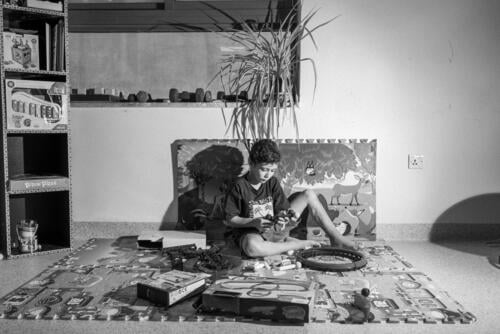
Deema wants to go back to school and to see her family, but not until the war is over and Gaza has been rebuilt.
“I just wish I could go back to school and finish my studies, and then I would like to become an engineer,” says Deema. “I wish that Gaza could return to how it once was. We don’t want to be displaced or pushed out, we just want to go back to our lives before the war.”
Five months after the catastrophic attack on his home, Karam is walking again, he is able to move his left arm and his left eye is slowly reopening – a near-miraculous recovery considering he was originally thought dead by medical staff at Al-Aqsa hospital.
Today, Karam is smiling as he lets go of his crutches in the physiotherapy department and grabs hold of the parallel stabilising bars to take a few steps forward. Before the war he had wanted to become a dentist, like his elder brother Tareq, but since being injured, he is not sure if this will be possible.
“I’m taking it one step at a time,” says Karam. “If the war ends, God willing, we will head back to Gaza. It’s my country, it’s where I spent my whole life. My friends are there. But for now, I’m here and I want to get better, one second at a time.”



